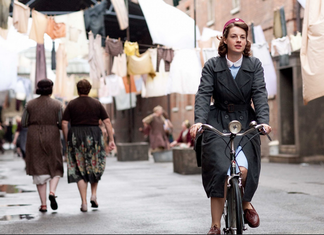
What did I do? I helped start up the Brighton Feminist Collective's project 40 Days of Treats, a counter action to 40 Days for Life prayer vigils. Inspired by a project going on elsewhere in the country, we decided we wanted to do something similarly supportive that wouldn't cause a ruckus. It involved the collective delivered flowers, cakes and cards to the staff at our local Bpas clinic to show our appreciation as the 40 Days of Prayer and Abort 67 protested outside. It was peaceful. Apart from the time I started a ruckus. Well, I didn't start it. I and a plastic foetus were somehow at the centre of a tiny ruckus. A ruckuslette, if you will, as I delivered cake.
Last Sunday the family show Call the Midwife aired a backstreet abortion. A woman who lived in a rat infested 2 room flat with her husband and 8 children found herself 'in the family way' again and desperate to rid herself of the pregnancy. Having repeatedly asked her midwife about sterilisation and contraception, not readily available on the NHS she tried boiling water and gin to encourage a miscarriage. When this failed she paid the local 'herbalist' to administer an abortion.
| The scene prompted complaints from campaigners to broadcasting watchdog OFCOM and the BBC. There was also praise and the charity FPA was pleased to be mentioned by Nurse Jenny when discussing the desperate mother's limited access to contraception. | wild guess – Joseph, Inn Keeper and Little Donkey weren't experts in obstetrics |
I will be honest. The scene – which cut between the abortion and the character Trixie getting ready for a disastrous date with a celebrity, was not gory but I do have a low tolerance for scenes that depict pain. I watch everything on my computer, I think my lap is part made of computer. I flicked to an article I had been reading earlier.
This does not, however, mean I think the BBC went too far in its portrayal of the backstreet abortion. The sheer desperation and isolation felt by the couple should make anybody grateful for the NHS, access to free contraception and safe, legal abortion. The painful thing is that the survival and full recovery of the frightened mother was rather optimistic airbrushing on the part of the BBC.
Natika Halil, Director of Information at the FPA commented on the episode that: “Back-street abortion is shocking and upsetting, but this was the grim reality for women in Britain before abortion became legal in 1967. FPA started running contraception clinics in the 1930s and what happened to women like ‘Nora’ in Call the Midwife is well documented. While it can be difficult to read or watch, the issue mustn’t be airbrushed. Some women died and many others suffered terrible health conditions as a result and this reminds us of a situation we must never go back to."
Squeamish Kate


 RSS Feed
RSS Feed
